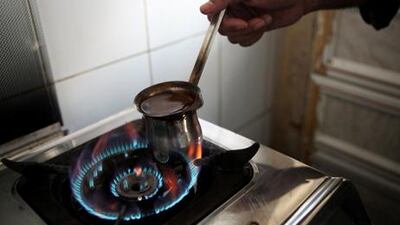When Lana al Jammal, 23, gets up in the morning, the first thing she reaches for is her coffee mug.
"Coffee is a basic need," she said. "It's what keeps me in the mood to get through the day."
This would be the first of six cups of coffee that Ms al Jammal consumes on an average day.
She is not alone; thousands of devoted coffee drinkers in the UAE must have their daily caffeine fix.
A Euromonitor report confirmed the UAE is the fastest growing market by volume for coffee in the world.
Between 2004 and 2009, the UAE has witnessed a remarkable 85 per cent growth rate in volume sales of fresh coffee, and sales are projected to grow another 80 per cent from 2009 to 2014.
The report added that the expansion of the coffee sector had been a region-wide sensation, with Egypt and Saudi Arabia alone accounting for about US$120 million (Dh441m) in spending through modern coffee shops last year, while markets like Lebanon, Kuwait, and the UAE had all witnessed dramatic expansions.
Avid coffee drinkers say that coffee shops and cafes offer a culturally acceptable meeting place for people to socialise and mingle, whether it is for business or pleasure.
"There's nothing better than catching up with a friend over a cup of coffee," Sarah Ahmed, 32, said. "When you're not hungry, but want something to enjoy while you chat, coffee is the best choice."
This booming coffee demand has not gone unnoticed by the world's largest brands. Starbucks, for example, now has about 300 locations in the Middle East, with 101 outlets in the UAE alone. The Costa Coffee brand has more than 150 locations, nearly half of which can be found in the UAE.
According to the Euromonitor report, one of the main contributing factors to this growth is the region's youthful population, a key demographic for coffee chains around the world.
The median age of the entire GCC population is just 26, while in the UAE people under 30 make up 44 per cent of the population, according to Euromonitor reports - all of which offers a promising market for the coffee industry.
Hala Abu Taha, a dietician specialist at Right-Bite, a nutrition and catering company, explained that in addition to being an affordable and culturally acceptable recreational beverage, coffee was also used as a stimulant.
"Students often find that they have no time for studying or making commitments except during the time they're supposed to be resting," she said. "So they often drink these beverages to keep themselves from sleeping."
Coffee was also a common diet tool, Ms Taha said. "Many teenagers, particularly females, feel full when they drink black coffee, so they use it as a substitute for regular food."
Khalisah Stevens, a 22-year-old international relations student at the American University of Sharjah, has been drinking coffee for four years. "I must have one cup a day, between 9am and 11am," she said. "I know I'm addicted, because if I don't have this cup I start getting withdrawal symptoms, like headaches and jitters."
Ms Taha said that while coffee seemed to have many pros, jitters, nervousness and insomnia were just some of the cons of excessive caffeine consumption.
"Yes, coffee does have many antioxidants, which help the cardiovascular system - but the same antioxidants can be derived from fruits and vegetables," she said.
"Each person has a different threshold for caffeine intake, and those who go beyond the threshold can experience symptoms like shivering, anxiety and a lack of sleep."
She added that "coffee is also a diuretic - it triggers frequent urination, which can ultimately lead to the loss of water".
Ms Taha emphasised that the level of acceptable intake varied for each individual, but suggested not to exceed more than two cups in one day. "The last cup of coffee should be drunk at least six to seven hours before sleeping to avoid sleep disruptions."

